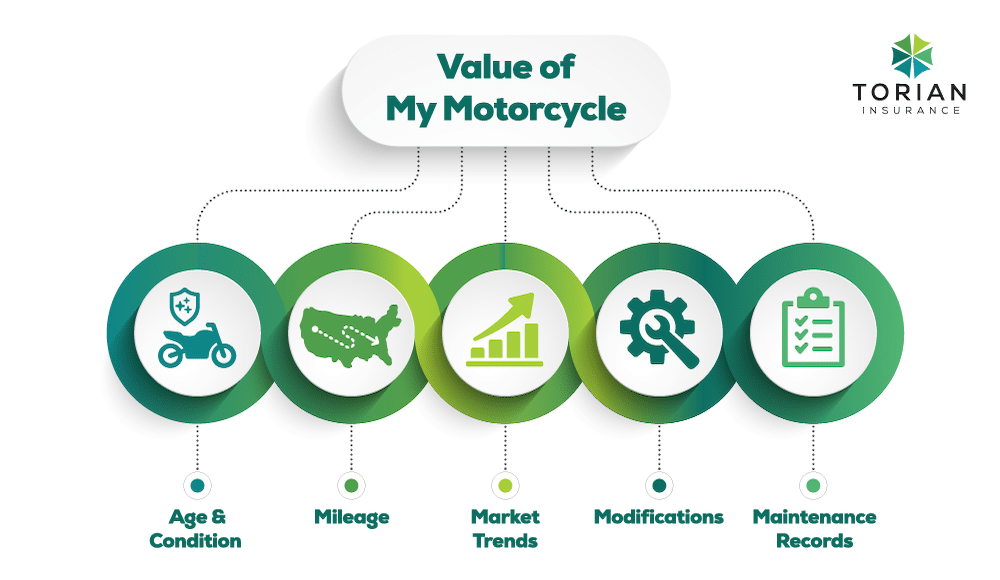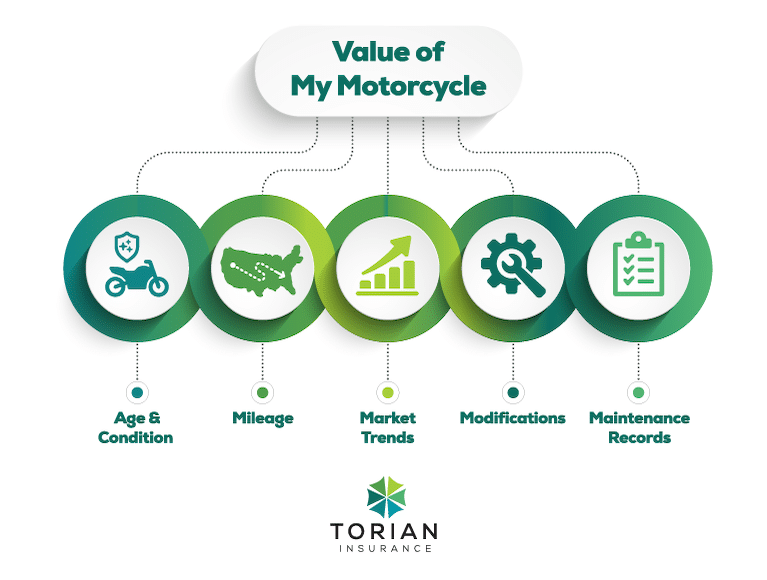Understanding the value of your motorcycle is crucial, especially when facing the unfortunate event of a total loss. Total loss motorcycle value calculators are essential tools for determining your bike’s worth after an accident. Navigating the complex world of insurance claims can be daunting, but with the right tools and guidance, you can ensure you receive fair compensation. At Torian Insurance, we are committed to helping clients in Southern Indiana, Illinois, and Kentucky understand and navigate these complexities with confidence.
Total Loss Motorcycle Value Calculators
When a motorcycle is deemed a total loss after an accident, determining its value becomes a critical step in the insurance claims process. A total loss motorcycle value calculator is a tool used to assess the monetary worth of your motorcycle at the time of the loss. This calculation takes into account various factors such as the bike’s age, condition, mileage, and market demand. By understanding how these calculators work, you can be better prepared to engage in the claims process and advocate for fair compensation.
At Torian Insurance, we recognize that each motorcycle and its owner are unique. Our commitment to personalized service means we take the time to understand your specific situation, ensuring that you are fully informed and supported throughout the claims process.
How Total Loss Motorcycle Value Is Determined Using Calculators
The total loss value of a motorcycle is not a random figure; it’s determined through a comprehensive evaluation of several key factors. Insurance companies use these factors to calculate the Actual Cash Value (ACV) or the Replacement Cost Value (RCV) of your motorcycle.
Factors Considered in Calculating Total Loss Value


- Age and Condition: Older motorcycles typically depreciate over time, but a well-maintained bike can retain more value. The overall condition, including wear and tear, previous damage, and maintenance records, plays a significant role.
- Mileage: Lower mileage often translates to higher value. High mileage may indicate more wear on the engine and other components.
- Market Trends and Regional Differences: Demand for certain makes and models can vary by region. A bike popular in Southern Indiana may have a different value in another part of the country.
- Special Features and Modifications: Depreciation reduces your motorcycle’s value over time. However, modifications and customizations can either increase or, in some cases, decrease the value. For example, performance upgrades may enhance value, while non-professional modifications might detract from it. Proper documentation and modification receipts for any modifications are essential to ensure they are factored into the valuation.
- Maintenance Records: Maintenance records play an important role in assessing the value of your motorcycle, particularly during the insurance claims process or when selling the vehicle. Well-maintained motorcycles tend to have a higher resale value.
Actual Cash Value vs. Replacement Cost Value
- Actual Cash Value (ACV): ACV is the fair market value of your motorcycle at the time of loss, considering depreciation. It’s the amount you could expect to receive if you sold your bike in its current condition. Understanding ACV is crucial for motorcycle owners to ensure they receive fair compensation.
- Replacement Cost Value (RCV): RCV refers to the cost of replacing your motorcycle with a new one of similar make and model without factoring in depreciation. RCV coverage provides peace of mind by covering the full cost of a new motorcycle despite depreciation, ensuring riders aren’t left out of pocket.
Understanding the distinction between ACV and RCV is crucial. Most standard insurance policies compensate based on ACV, but knowing your motorcycle’s RCV can provide leverage during negotiations.
Role of Independent Insurance Agents in Value Determination
Independent insurance agents provide personalized service and evaluate insurance needs, which can include helping to understand motorcycle values.
Technical Aspects of Motorcycle Value Calculators
Total loss motorcycle value calculators utilize advanced data analytics and algorithms to estimate your bike’s value accurately.
How These Calculators Use Data Analytics and Algorithms
These calculators aggregate data from various sources, including:
- Market Databases: Information on recent sales of similar motorcycles.
- Depreciation Models: Standard depreciation rates based on age and mileage.
- Regional Adjustments: Local market conditions affecting supply and demand.
- Condition Reports: Details about the motorcycle’s condition prior to the loss.
By inputting specific information about your motorcycle, the calculator processes this data to generate an estimated value. The algorithms are designed to reflect real-world market conditions as closely as possible.
Role of Databases and Historical Data in Valuation
Historical sales data provides a benchmark for current valuations. For instance, if a particular model has consistently held its value over the years, this trend will influence the calculator’s output. Access to comprehensive and up-to-date historical sales data ensures more accurate assessments.
Comparing Calculator Outputs to Professional Appraisals
While total loss motorcycle value calculators offer a convenient estimate, they may not capture all the nuances of your motorcycle’s unique features. Professional appraisals involve a thorough inspection by an expert who can account for customizations and rare components.
Using a Total Loss Motorcycle Value Calculator
Understanding how to use these calculators effectively can empower you in the claims process.
Step-by-Step Guide on Using Total Loss Motorcycle Value Calculators
- Gather Information: Collect all relevant information about your motorcycle, including make, model, year, mileage, VIN, and any modifications or accessories.
- Select a Reliable Calculator: Choose a reputable calculator, preferably recommended by your insurance agent.
- Input Accurate Data: Enter the information carefully. Ensure all details are correct to obtain an accurate estimate.
- Review the Estimate: Analyze the calculated value and consider how it aligns with your expectations and market knowledge.
- Consult Your Insurance Agent: Share the estimate with your agent to discuss its implications for your claim.
Advantages of Using Total Loss Motorcycle Value Calculators
Using total loss motorcycle value calculators offers several advantages that can be incredibly beneficial in the claims process. First and foremost, these calculators help with preparation by providing you with an estimate of your motorcycle’s value. This preparation is crucial when you enter discussions with your insurance company, as it allows you to have a clear understanding of what to expect.
In addition, these calculators offer transparency by clearly outlining the method used to determine the value of your motorcycle. This transparency ensures you fully understand how your motorcycle’s value is calculated, leaving little room for confusion or doubt.
Perhaps one of the most significant advantages is the tool’s role in negotiation. By equipping you with solid data, you are better positioned to support your case for fair compensation, ensuring that you receive an equitable settlement from your insurance provider.
Common Misconceptions and Errors to Avoid
When considering common misconceptions and errors to avoid, it’s important to address several key areas. Firstly, overestimating the value of motorcycle modifications is a frequent mistake. Many tend to assume that all customizations will significantly enhance their asset’s worth, but this is not always the case. It’s crucial to be realistic about the actual impact these changes will have, as not every modification translates to added value.
Secondly, ignoring depreciation is another pitfall. The reality is that age and wear inevitably affect an item’s value, and expecting to receive the full replacement cost without having specific coverage for this can be misleading and unrealistic.
Lastly, providing incorrect information is a common error that can lead to flawed estimates. Accurate data input is essential; otherwise, you risk basing decisions on erroneous calculations.
Case Example: Understanding a Sample Calculation
Scenario: You own a 2017 Yamaha YZF-R6 with 8,000 miles on the odometer. The motorcycle is in excellent condition, and you’ve added several aftermarket parts, including:
- Custom Exhaust System: Valued at approximately $1,000
- Upgraded Suspension: Valued at $800
- Performance ECU Tuning: Valued at $500
Step 1: Base Value Assessment
- The calculator begins by determining the base value of a 2017 Yamaha YZF-R6 with 8,000 miles in excellent condition based on market data. According to Kelley Blue Book, the base value is approximately $10,275*. (This is subject to change)
Step 2: Adjustments for Condition
- Since the motorcycle is in excellent condition, the value may be adjusted upwards slightly, perhaps by $500.
Step 3: Adding Value of Modifications
- The total value of documented modifications is estimated based on market trends and desirability.
Step 4: Final Estimated Value
- Base Value: $10,275
- Condition Adjustment: +$500
- Modifications: +$2,300
- Total Estimated Value: $13,075
By understanding this calculation, you are prepared to discuss the valuation with your insurance adjuster. You can provide documentation for your modifications to ensure they are included in the assessment.
DISCLAIMER: The figures and calculations presented in this use case example are intended solely for educational purposes and illustrative value. They are not reflective of actual market conditions or specific scenarios. Users should not rely on these numbers in real-world applications or decision-making processes. For accurate and tailored assessments, please consult a qualified professional or utilize precise data relevant to your individual circumstances.
Additional Tips for Using Total Loss Motorcycle Value Calculators
- Keep Detailed Records: Maintain receipts and records for all modifications and maintenance.
- Regularly Update Valuations: Market values fluctuate, so it’s helpful to reassess your motorcycle’s value periodically.
- Consult Professionals: When in doubt, seek professional appraisal services, especially for high-value or extensively customized motorcycles.
Understanding the Motorcycle Insurance Claims Process
Navigating the insurance claims process can be complex, but knowing what to expect can make it smoother.
Steps Involved in Filing a Motorcycle Insurance Claim
- Report the Incident: Immediately notify the police and obtain a report if necessary.
- Contact Your Insurance Agent: Inform them of the accident as soon as possible.
- Provide Necessary Documentation: Submit required forms, proof of ownership, photos, and any other relevant information. Common key documents include:
- Police Reports: Official documentation of the incident
- Ownership Documents: Title, registration, and proof of ownership
- Maintenance Records: Demonstrates the condition of the motorcycle
- Modification Receipts: Proof of customizations and upgrades
- Photographs: Visual evidence of the damage
- Assessment by Adjuster: An insurance adjuster will evaluate the damage and determine if the motorcycle is a total loss.
- Value Determination: The total loss value is calculated, considering factors discussed earlier.
- Settlement Offer: You receive a compensation offer based on the valuation.
- Negotiation: If necessary, you can negotiate the offer with supporting evidence.
- Finalization: Once agreed upon, the settlement is processed, and you receive compensation.
Timeline Expectations for Motorcycle Insurance Claim Processing
The duration varies, but understanding the general timeline helps set realistic expectations.
- Initial Reporting: Immediate
- Adjuster Assessment: Within a few days to a week
- Valuation and Offer: Typically within two weeks
- Negotiation: Time varies based on complexity
- Settlement: After agreement, payment is usually processed within days
Potential Challenges During the Claims Process
During the claims process, which is generally designed to be straightforward, you may still encounter several potential challenges. One common issue is discrepancies in valuation, where the insurance company’s assessment of your claim might not align with your expectations. This difference can lead to disputes and may require additional negotiations to reach an agreeable resolution.
Another challenge is the potential for delays. Processing times can become extended, especially during periods of high claim volumes or in cases that are particularly complex. Such delays can be frustrating, as they prolong the time it takes for the claim to be resolved and for any payments to be made.
Additionally, documentation issues can also impede the progress of the claims process. Missing or incomplete documentation is a frequent stumbling block that can significantly slow down the entire procedure. Ensuring that all necessary documents are accurate and complete from the outset can help mitigate this challenge, facilitating a smoother and more efficient claims process.
Importance of Accurate Value Assessment in Claims
Accurate value assessments play a critical role in the claims process for motorcycle insurance, as they directly impact the fairness of the compensation you receive. When a settlement offer is made, it is typically based on the total loss value of your motorcycle. An assessment that undervalues your motorcycle can lead to significant financial challenges.
For instance, if modifications and enhancements to your bike are not properly accounted for, you might receive a payout that falls short of the motorcycle’s true worth. This can leave you without sufficient funds to replace your vehicle or settle any outstanding loans, potentially resulting in a financial shortfall that you must cover out-of-pocket.
Conversely, anticipating an overvaluation could lead to unrealistic expectations, which often result in disputes with the insurance company. These disputes can prolong the settlement process, delaying the resolution of your claim and the delivery of any compensation you are owed. Ultimately, both undervaluation and overvaluation come with real-world implications that can greatly impact your financial stability and the efficiency with which your claim is processed.
Legal and Financial Implications
An accurate value assessment not only impacts your immediate compensation but can also have broader financial implications:
- Loan Balances: If you have a loan on your motorcycle, an undervaluation might result in a settlement that doesn’t cover your remaining balance.
- Replacement Costs: Insufficient compensation may prevent you from purchasing a comparable replacement motorcycle.
- Insurance Premiums: Accurate valuations can influence future insurance premiums, ensuring they are based on correct information.
Benefits of Personalized Service in Achieving Fair Assessments
Working with an independent agent like Torian Insurance ensures a thorough evaluation of your insurance needs, which can help in understanding your motorcycle’s value.
Torian Insurance’s Expertise in Handling Motorcycle Claims
Torian Insurance recognizes that motorcycle owners have specific needs and concerns. Our expertise includes:
- Specialized Knowledge: Understanding the nuances of motorcycle insurance, including total loss valuations and coverage options.
- Dedicated Claims Assistance: Assigning experienced agents who focus on motorcycle claims to guide you through the process.
- Community Engagement: Active participation in local events and groups to stay connected with the community.
Torian’s Local Presence
Our local offices in Evansville, Indiana, mean you can speak directly with agents who understand regional market conditions and specific challenges faced by motorcycle owners in our community.
We believe in building lasting relationships with our clients. Our commitment to exceptional customer service is reflected in the trust our clients place in us.
Advantages of Working with Independent Insurance Agents
Personalized Service Differing from Larger Firms
Independent agents offer a level of personalized service that larger firms often cannot match. We take the time to understand your individual circumstances and provide customized solutions.
Benefits of Accessing a Wider Network of Insurance Providers
By working with multiple insurance companies, we can find the best policies and rates to suit your needs, ensuring you have options that align with your budget and coverage requirements.
Commitment to Client Education and Satisfaction
We prioritize educating our clients, helping you make informed decisions about your insurance coverage.
Tailored Insurance Solutions to Meet Specific Client Needs
Whether you have a standard motorcycle or a custom-built bike with unique features, we can tailor your insurance policy to provide the appropriate motorcycle coverage.
Comparative Advantage over Captive Agents
Captive agents represent a single insurance company, which may limit the options available to you. In contrast, independent agents:
- Offer Choices: Providing multiple policy options from various insurers to find the best fit.
- Unbiased Advice: Recommending products based on your needs rather than company quotas.
- Flexibility: Ability to adjust coverage and switch providers if your circumstances change without losing your trusted agent.
Don’t Leave Your Motorcycle’s Value to Chance
Accurate motorcycle valuations are your key to fair compensation. Navigating the complexities of total loss motorcycle valuations and insurance claims doesn’t have to be overwhelming. Understanding how value calculators work and the factors that influence your motorcycle’s worth empowers you to advocate for fair compensation. Accurate valuations ensure you receive what you deserve, safeguarding your financial interests.
At Torian Insurance, we’re here to support you every step of the way. Our 100+ years of experience and deep roots in the community make us a trusted partner for motorcycle owners. We offer personalized service, expert guidance, and a commitment to your satisfaction.
Reach out to Torian Insurance today for personalized assistance and expert guidance through the claims process.



